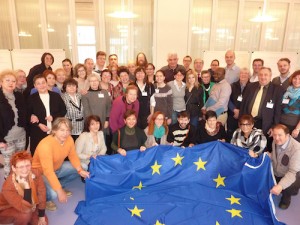 Empowering civil society: 50 participants and great ideas at DANET’s first qualification seminar
Empowering civil society: 50 participants and great ideas at DANET’s first qualification seminar
The „Danube-Networkers for Europe“ (DANET) e.V. has organized its first qualification seminar for 50 civil organization chief executives from all countries situated at the Danube river. The participants stayed in the “Haus auf der Alb” conference house in Bad Urach from December 8th to December 12th, 2014. The goal of the seminar was to enhance the cooperation of civil society organizations in the European Danube Area and strengthen their capabilities in terms of project design and proposal writing.
The participants, residents of twelve different countries,learned more about the Baden-Württemberg Foundation and it programme „Perspective Danube: Education, Culture and Civil Society“. Representatives of the State Ministry of Baden-Württemberg, Ministry for Education, Youth, Sport, Europa Zentrum Baden-Württemberg – Institute and Academy for European Affairs provided the participants with information about European Union project-supporting measures suitable for transnational educational work in the fields of senior adult life-long learning, social participation and inter-generational dialogue as well as about EUSDR.
As a part of application procedure, training participants submitted their project ideas and initiatives they would like to deal with. With professional support of coaches Michael Seidler und Andy Stirnal from EuroConsults (Berlin) and Anna Ditta from ALDA Vicenza (Italy) as well as our experienced experts and associates Gabriele Körting (Ulm) and Ljiljana Zizic (Backa Palanka) Serbien, participants managed to build small groups around 6 project ideas. A work in small groups created a solid base for project proposals on later stage.
The “Environment” group designed an intergenerational project of protecting endemic plants of the Danube Region: groups of senior citizens should cooperate with groups of young students in growing, defining and cataloguing plants in a botanical garden, comparing the variety of endemic plants and developing protective measures together. The “Food group” brought up ideas how to enhance integration of handicapped people in Danube festivities in different countries and special participation made for them, such as olfactory and haptic activities for blind people. The group dealing with culture topics created a digital interactive culture path along the Danube. The working group “Education” pointed out project ideas for the development of “Green jobs” for young jobless people. Each project outline was made in the form of a first application draft, following special EU funding programs put out for tender, to be refined later. After training participants continued with their collaboration and created several proposals based on project ideas from Bad Urach. Six of them have already been submitted for a grant in 2015. That are „Personal Stories – EU History“, Increasing regional understanding by building language competencies and digital competencies. Build relationships between cities and towns in the Danube region, There was my factory (MYF), The Day After: Postwar everyday city life, Conceptualizing and implementing the role of cultural mediators and mediating in museums, and DanceLit.
The five-days seminar was supported by the foundation “Baden-Württemberg Stiftung”, and run in cooperation with the “Landeszentrale für politische Bildung”.
